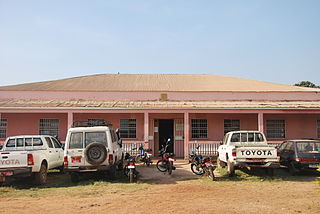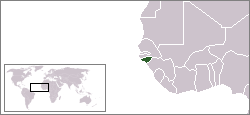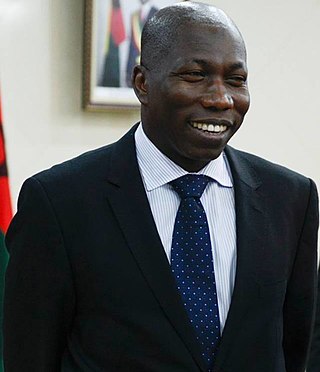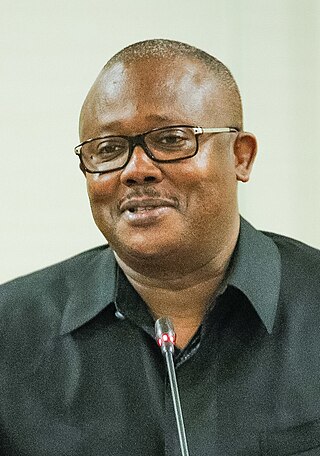Related Research Articles

Guinea-Bissau, officially the Republic of Guinea-Bissau, is a country in West Africa that covers 36,125 square kilometres (13,948 sq mi) with an estimated population of 2,026,778. It borders Senegal to its north and Guinea to its southeast.

Bissau is the capital and largest city of Guinea-Bissau. As of 2015, it had a population of 492,004. Bissau is located on the Geba River estuary, off the Atlantic Ocean, and is Guinea-Bissau's largest city, major port, its administrative and military center.

The Republic of Guinea-Bissau follows a nonaligned foreign policy and seeks friendly and cooperative relations with a wide variety of states and organizations. France, Portugal, Angola, Brazil, Egypt, Nigeria, Libya, Cuba, the Palestine Liberation Organization, Ghana, and Russia have diplomatic offices in Bissau.

Malam Bacai Sanhá was a Guinea-Bissau politician who was President of Guinea-Bissau from 8 September 2009 until his death on 9 January 2012. A member of the African Party for the Independence of Guinea and Cape Verde (PAIGC), Sanhá was President of the National People's Assembly from 1994 to 1999 and then served as acting President of Guinea-Bissau from 14 May 1999, to 17 February 2000, following the ouster of President João Bernardo Vieira. Standing as the PAIGC candidate, he placed second in the 1999–2000 presidential election as well as the 2005 presidential election before winning the June–July 2009 presidential election.

The Bandim Health Project works with population based health research in one of the world's poorest countries, Guinea-Bissau in West Africa.

Guinea-Bissau–United States relations are bilateral relations between Guinea-Bissau and the United States.

The following outline is provided as an overview of and topical guide to Guinea-Bissau:
Senegal is a source, transit, and destination country for children and women trafficked for the purposes of forced labor and commercial sexual exploitation. Trafficking within the country is more prevalent than trans-border trafficking and the majority of victims are children. Within Senegal some boys called "talibes" are victims of trafficking, by promising to educate them, but subjecting them instead to forced begging and physical abuse. A 2007 study done by UNICEF, the ILO, and the World Bank found that 6,480 talibe were forced to beg in Dakar alone. Women and girls are trafficked for domestic servitude and sexual exploitation, including for sex tourism, within Senegal. Transnationally, boys are trafficked to Senegal from The Gambia, Mali, Guinea-Bissau, and Guinea for forced begging by religious teachers. Senegalese women and girls are trafficked to neighboring countries, the Middle East, and Europe for domestic servitude and possibly for sexual exploitation. Women and girls from other West African countries, particularly Liberia, Ghana, Sierra Leone, and Nigeria may be trafficked to Senegal for sexual exploitation, including for sex tourism.

Lesbian, gay, bisexual, and transgender (LGBT) people in Guinea-Bissau face legal challenges not experienced by non-LGBT residents. Same-sex sexual activity is legal in Guinea-Bissau, but same-sex couples and households headed by same-sex couples are not eligible for the same legal protections available to opposite-sex couples.
The International Association of National Public Health Institutes (IANPHI) is an international umbrella organization of national public health institutes (NPHIs), public health government agencies working to improve national disease prevention and response. IANPHI is made up of 100+ members, located in more than 90 countries. An important goal of IANPHI is to improve health outcomes by strengthening NPHIs or supporting countries in creating new NPHIs.

Domingos Simões Pereira is a Bissau-Guinean politician who was Prime Minister of Guinea-Bissau from 2014 to August 2015. He previously served as Executive Secretary of the Community of Portuguese Language Countries, also known as the Lusophone Commonwealth, from 2008 to 2012.

Umaro Mokhtar Sissoco Embaló is a Bissau-Guinean politician serving as the president of Guinea-Bissau since February 2020. He is a political scientist and military officer who previously served as prime minister between November 2016 and January 2018.

Corruption in Guinea-Bissau occurs at among the highest levels in the world. In Transparency International's Corruption Perceptions Index for 2023, Guinea-Bissau scored 22 on a scale from 0 to 100. When ranked by score, Guinea-Bissau ranked 158th among the 180 countries in the Index, where the country ranked first is perceived to have the most honest public sector. However, Guinea-Bissau's score has either improved or remained steady every year since its low point in 2018, when it scored 16. For comparison with worldwide scores, the best score in 2023 was 90, the average score was 43, and the worst score was 11. For comparison with regional scores, the average score among sub-Saharan African countries was 33. The highest score in sub-Saharan Africa was 71 and the lowest score was 11. In 2013, Guinea-Bissau scored below the averages for both Africa and West Africa on the Mo Ibrahim Foundation’s Index of African Governance.
The Ministry of Justice of Guinea-Bissau has duties such as overseeing the administration and human resources of the judiciary and the Public Prosecutor, publishing and disseminating legal information to the public, and combating organized crime and drug trafficking that might threaten the safety of the country's citizens and impact the justice system.

Guinea-Bissau–Spain relations are the bilateral and diplomatic relations between these two countries.
The COVID-19 pandemic in Guinea-Bissau is part of the worldwide pandemic of coronavirus disease 2019 caused by severe acute respiratory syndrome coronavirus 2. The virus was confirmed to have reached Guinea-Bissau in March 2020.
Events in the year 2020 in Guinea-Bissau.
References
- ↑ "Ministry of Public Health, Guinea-Bissau". DevelopmentAid. Retrieved 2021-02-23.